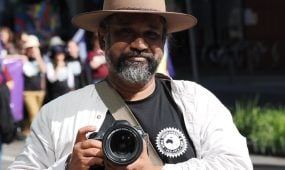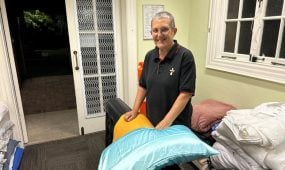Young inter-faith leaders reflect on their "Gathering in Prayer for Gaza" ceasefire vigil
Justice & Advocacy
Five young Christian, Jewish, Muslim and Tamil Hindu community members reflect on the prayer spaces, holy text readings and prayers that they led at a recent “Gathering in Prayer for Gaza” inter-faith prayer vigil at St Andrew’s, Indooroopilly
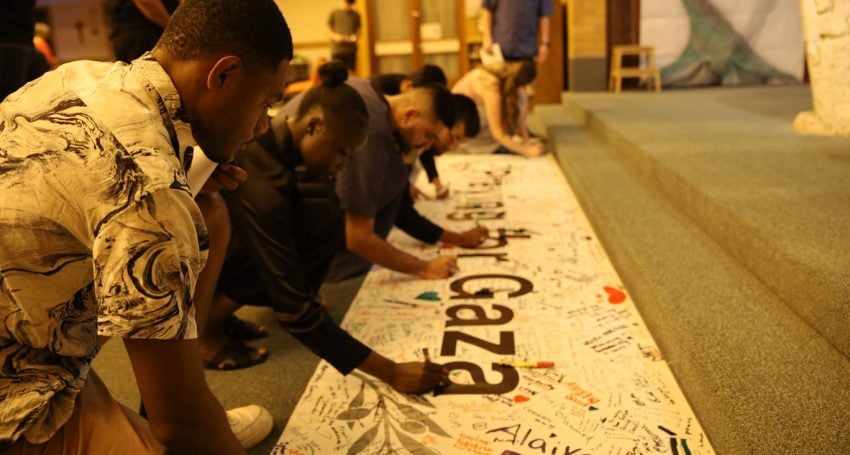
A youth-led “Gathering in Prayer for Gaza” inter-faith vigil was held at St Andrew’s, Indooroopilly recently to pray for a permanent ceasefire; lament the lives lost to violence; pray for the release of the thousands of child and adult Palestinians arbitrarily arrested in Gaza, the release of remaining Israeli hostages, and the release of Palestinian political prisoners; and, pray for a just peace. The peace vigil included prayers, readings from holy texts and prayer spaces, with fellowship over traditional Palestinian food after the vigil.
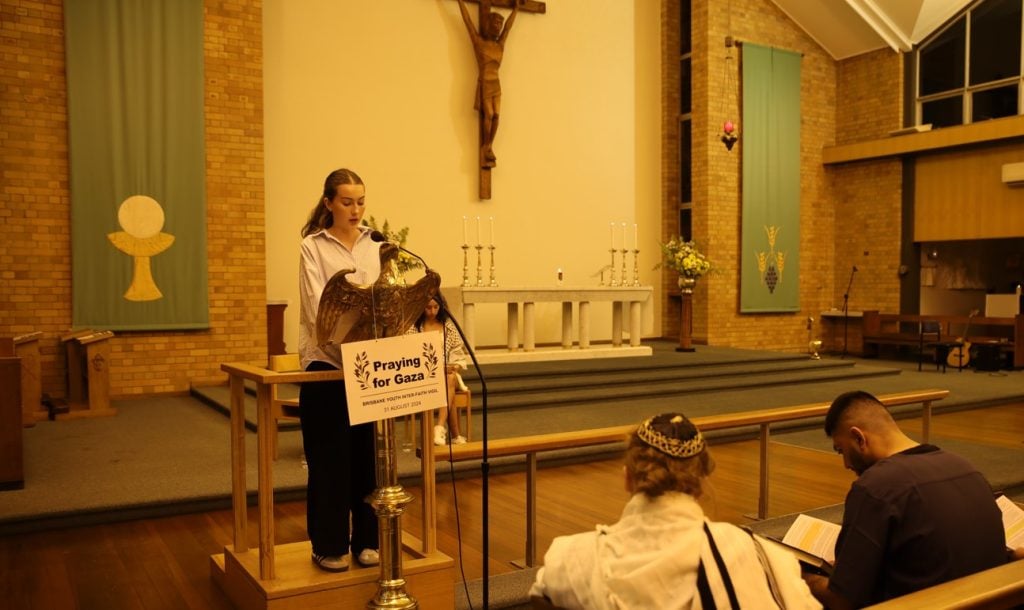
Parish of Indooroopilly community member and future journalist Lela said a prayer for journalists reporting in Gaza (including for young journalists) at the “Gathering in Prayer for Gaza” inter-faith ceasefire vigil at St Andrew’s, Indooroopilly on 31 August 2024
Lela — Parish of Indooroopilly community member and vigil organiser and co-MC
It was an honour to lead the organising of this vigil and to co-MC the vigil with Leia, who is a young Palestinian Muslim.
During the night I thought it was really powerful to see everyone gathered together around the prayer station that showed the names of the children killed in Gaza and Israel. Although an extremely sad moment for all, it was moving for me to see many people gathered to lament the children’s lives lost and to light remembrance candles.
The prayer space that resonated the most with me was the olive tree prayer space. Leia’s grandfather’s olive trees have been uprooted by Israeli soldiers nearly every year since 2002. Her grandfather’s stoic replanting of the trees, even though they keep getting uprooted, is a representation of the persistence of the Palestinian people. The vigil’s hand-painted olive tree was a place for everyone to come together to write a message or prayer of hope for the Palestinian people on a leaf that was adhered to the tree. The tree also symbolised Leia’s grandfather’s hope that his trees will one day reach maturity and for the prayers and hopes of Palestinians to one day reach maturity, too.
I think it is important for young people from different faith backgrounds to gather in unity so that we have a place to reflect on the traumatising human rights violations that we are seeing happening to Palestinians on our phone and computer screens.
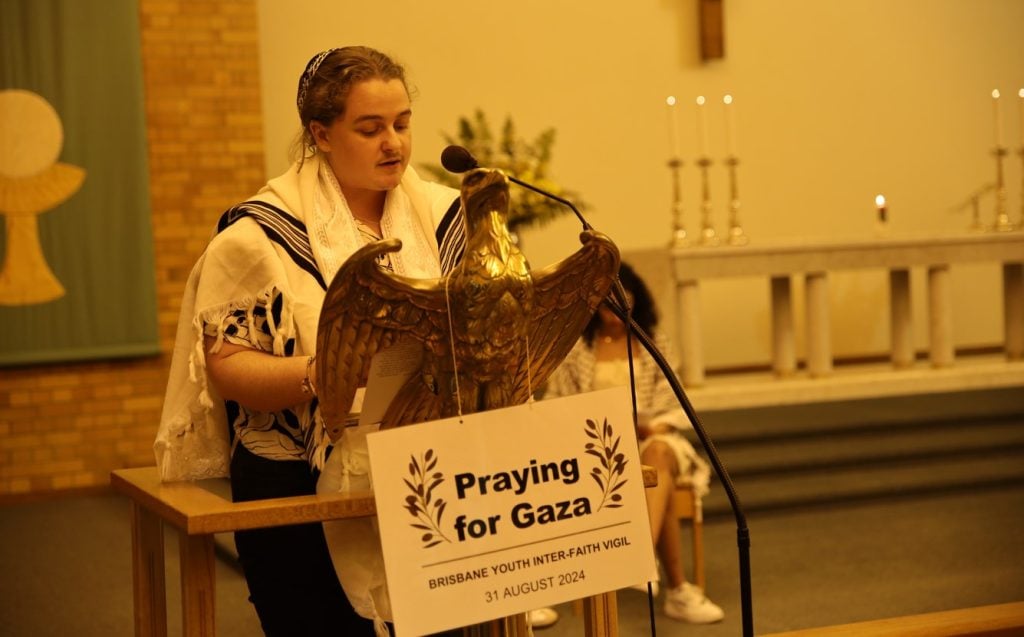
Jewish community member and teacher Bry read “The Eternal Truth” (by Solomon ben Isaac, with excerpts from Isaiah and Leviticus) and prayed for the future education of Palestinian children in Gaza at the “Gathering in Prayer for Gaza” inter-faith ceasefire vigil at St Andrew’s, Indooroopilly on 31 August 2024
Bry — Jewish community member
It was fantastic for people of all ages to come together to a youth-led vigil in solidarity and to express connection and unity. In particular, hearing so many young people of different faiths reading from their holy texts and prayers was incredibly special. Muhammad’s Quran recitation was absolutely gorgeous. Another deeply moving moment was hearing the Tamil holy text (written by Thiruvalluvar) read by Priya, especially the lines:
“Who grieves confront with meek, ungrieving heart,
From them grieves, put to grief, depart.” (Kural 623)
There was such beauty — both in the differences in expression and the common message about peace and justice. Expressing grief, anger, and hope for the future together was powerful.
The olive tree prayer space resonated with me the most. I loved that we were able to reflect on something so real and immediate and close to some of the people present. The farmer featured in the story is the grandfather of one of the MCs, Leia. Leia’s grandfather has replanted his 500 olive trees nearly every year for over 15 years. His maturing trees are bulldozed or his young trees are uprooted by hand, by the so-called Israeli Defense Forces, after he replants them. Leia’s grandfather’s response here symbolises Palestinian resilience against occupation and oppression.
It’s so important for young people of faith to understand that what is happening in Palestine and Israel is not a “Jew versus Muslim” issue — it’s not a matter of religion. This is a human rights matter — Palestinians have a right to self-determination and to be free of occupation, apartheid and genocide. It’s especially important for young people to understand this because they shape the future — as activists, as advocates and as policy makers.
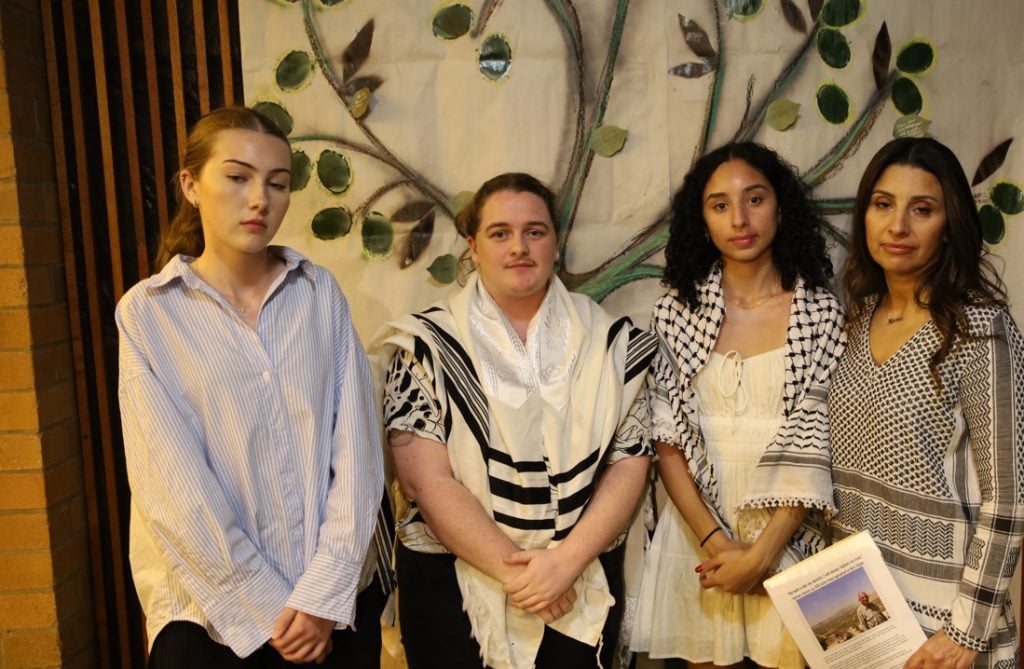
Jewish, Christian and Muslim community members gathered in an olive tree prayer space at the “Gathering in Prayer for Gaza” inter-faith ceasefire vigil at St Andrew’s, Indooroopilly on 31 August 2024 — Leia’s grandfather and Dr Nermin’s father has replanted his 500 olive trees nearly every year since 2002
Leia — Palestinian and Muslim and co-MC
A specific part of the vigil that really spoke to me was that everybody appreciated each other and respected each other and were able to come to come together and pray for Palestine and the injustices happening, regardless of their faith or background.
I actually found that two prayer spaces resonated with me most. The first one was the one that had the story of my grandfather, which was obviously very close to my heart. The other prayer space that really resonated with me was the one with the names of the child victims rolling on the screen because, although it was a quiet, the silence spoke volumes.
Gathering young people from diverse faith backgrounds to lead prayers for Palestinians is crucial for fostering solidarity and support amid ongoing hardships. Such events promote interfaith understanding, break down stereotypes and build meaningful relationships. They empower youth to advocate for peace and justice while raising awareness about the challenges faced by Palestinians. By coming together in prayer, participants emphasise a shared hope, highlighting that compassion transcends religious and cultural divides. Ultimately, these gatherings inspire collective action and a commitment to humanitarian values, reinforcing the importance of unity in addressing complex global issues.
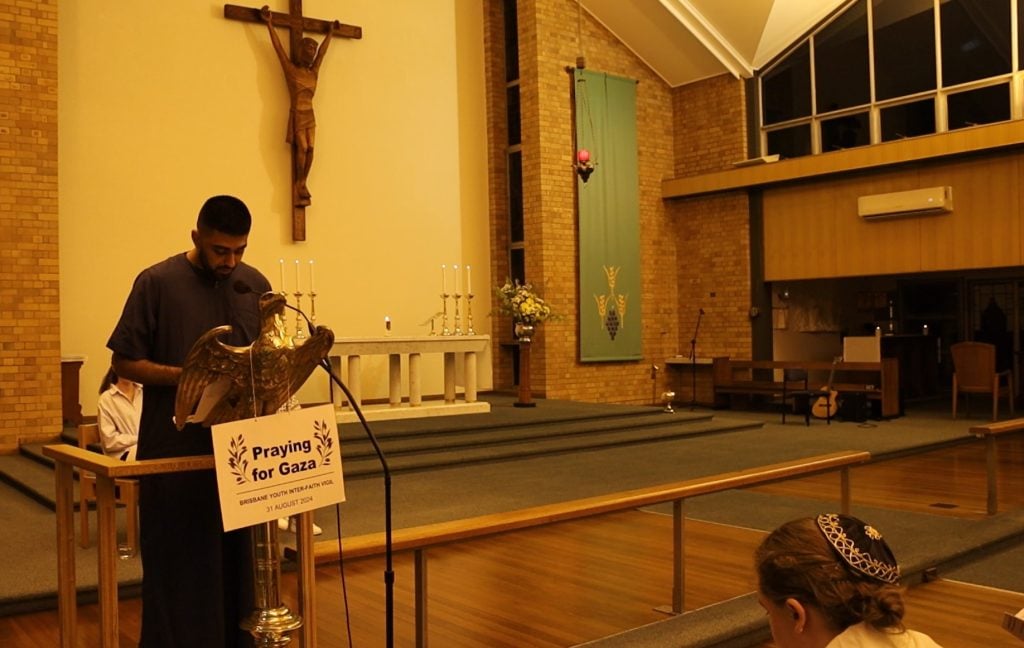
Shia Muslim community member and engineering student Muhammad recited from the Quran and prayed for the rebuilding of Gaza and the safety of children at the “Gathering in Prayer for Gaza” inter-faith ceasefire vigil at St Andrew’s, Indooroopilly on 31 August 2024
Muhammad — Shia Muslim community member
My highlight of the youth-led “Gathering in Prayer for Gaza” vigil was when everyone was praying or reflecting at the different prayer stations. Everyone called upon their God to alleviate the Palestinians in Gaza who have endured so much over the last year. They stood in solidarity as they prayed.
The prayer space featuring the names of children, who have died since October, on the screen was very moving. The speed at which the thousands of names rolled on the screen in the 20-minute prayer station period was very sad, to say the least. It was difficult to focus on a single child’s name. I prayed for mercy and that no more names would be added to the list of children who have died. I also prayed for the children’s surviving family members.
Gathering is important because it shows that we value life and are willing to stand up against oppression together, even though our faiths are different. Our shared morals, values and integrity brought us together.
We stood in solidarity knowing that what is happening to Palestinians isn’t about religion — it’s about land and the Indigenous Palestinians are being dispossessed through an ongoing process of illegal occupation and settler-colonialism.
People of faith especially need to show that what is happening in Gaza is now beyond catastrophic. Basic human rights are being denied by the state of Israel. Palestinian children, like all children, have a right to live in peace and safety.
In the Muslim faith, two core values and duties revealed in the Quran and the Hadith are enjoining good, including standing with those who do good, and forbidding wrong, including standing with those who resist evil. I think the youth who led the vigil, along with those who gathered, fulfilled both these.
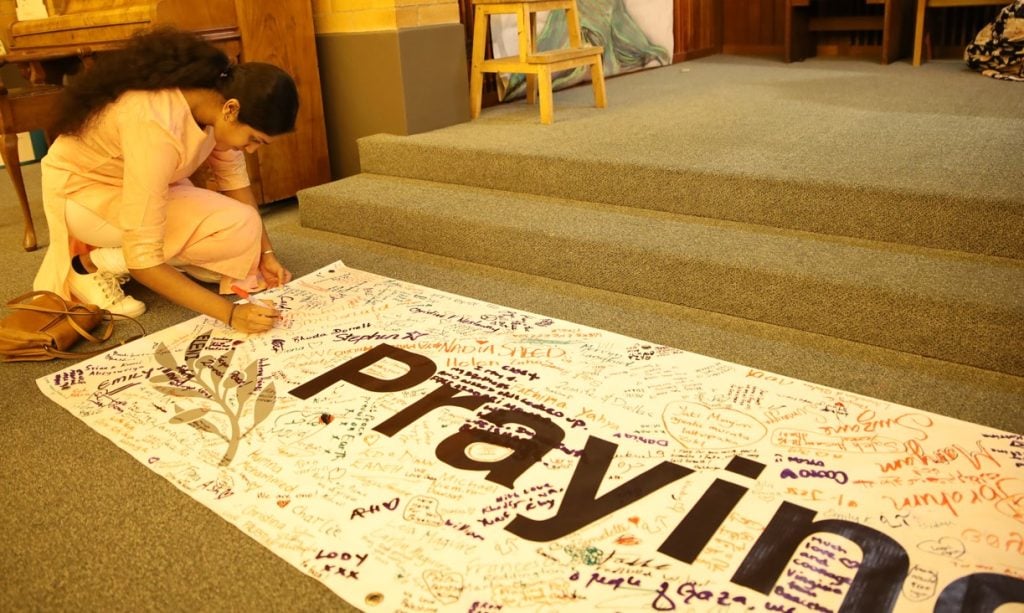
Young Tamil community member Priya read from Thirukural and prayed for food and medical aid to reach Palestinian children unimpeded in Gaza at the “Gathering in Prayer for Gaza” inter-faith ceasefire vigil at St Andrew’s, Indooroopilly on 31 August 2024
Priya — Tamil Hindu community member
For me, the vigil was particularly moving because it honoured the lives of people who have died in Gaza and the voices of those who have so far survived. Coming together with young people from different cultures and faiths showed our shared commitment to pray for peace and to recognise the profound sacrifices made, including of the journalists who have been killed.
The prayer space that resonated with me the most was reading some of the names of the children who are victims of the war. These children should have had the chance to experience childhood and a future full of possibilities. As I lit a candle, I felt a deep sense of sorrow for their unjust suffering and death. I prayed for their souls to rest in peace and for an end to the ongoing suffering in Palestine, hoping for peace and justice for all.
It is important for young people from different faith backgrounds to gather and lead prayers for Palestinians because it shows unity, compassion and solidarity across our community. By praying for those suffering, we make their voices heard and their pain recognised. Collectively, these prayers transcend religious and cultural differences, sending a powerful message of shared humanity. By uniting in this way, we raise awareness about the plight of Palestinians, recognise their struggles, and hope for peace and justice.
Jump to next article
